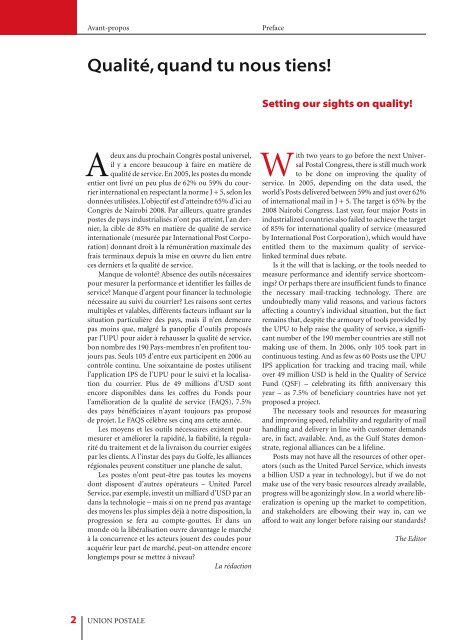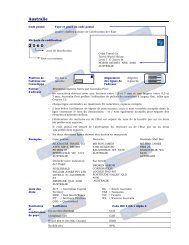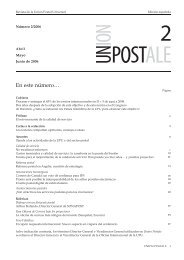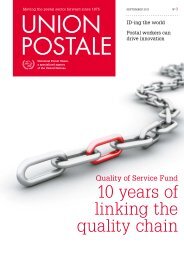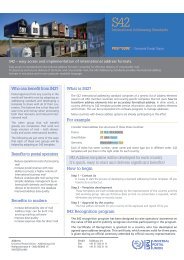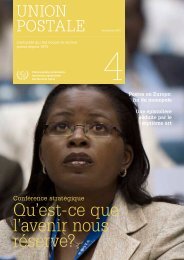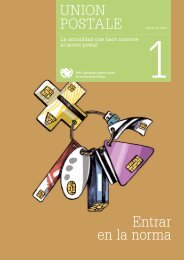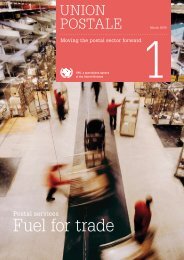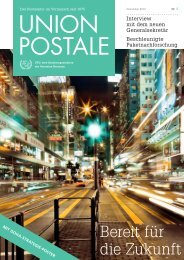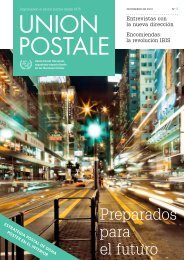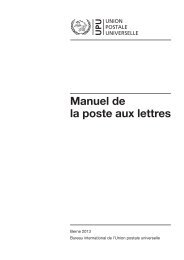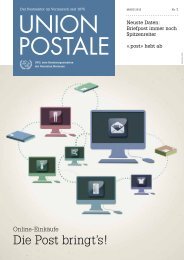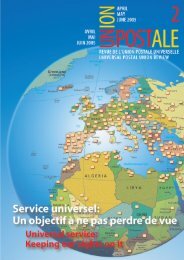Union Postale, revue de l'Union postale universelle - UPU ...
Union Postale, revue de l'Union postale universelle - UPU ...
Union Postale, revue de l'Union postale universelle - UPU ...
- No tags were found...
You also want an ePaper? Increase the reach of your titles
YUMPU automatically turns print PDFs into web optimized ePapers that Google loves.
Avant-proposPrefaceQualité, quand tu nous tiens!Setting our sights on quality!A<strong>de</strong>ux ans du prochain Congrès postal universel,il y a encore beaucoup à faire en matière <strong>de</strong>qualité <strong>de</strong> service. En 2005, les postes du mon<strong>de</strong>entier ont livré un peu plus <strong>de</strong> 62% ou 59% du courrierinternational en respectant la norme J + 5, selon lesdonnées utilisées. L’objectif est d’atteindre 65% d’ici auCongrès <strong>de</strong> Nairobi 2008. Par ailleurs, quatre gran<strong>de</strong>spostes <strong>de</strong> pays industrialisés n’ont pas atteint, l’an <strong>de</strong>rnier,la cible <strong>de</strong> 85% en matière <strong>de</strong> qualité <strong>de</strong> serviceinternationale (mesurée par International Post Corporation)donnant droit à la rémunération maximale <strong>de</strong>sfrais terminaux <strong>de</strong>puis la mise en œuvre du lien entreces <strong>de</strong>rniers et la qualité <strong>de</strong> service.Manque <strong>de</strong> volonté? Absence <strong>de</strong>s outils nécessairespour mesurer la performance et i<strong>de</strong>ntifier les failles <strong>de</strong>service? Manque d’argent pour financer la technologienécessaire au suivi du courrier? Les raisons sont certesmultiples et valables, différents facteurs influant sur lasituation particulière <strong>de</strong>s pays, mais il n’en <strong>de</strong>meurepas moins que, malgré la panoplie d’outils proposéspar l’<strong>UPU</strong> pour ai<strong>de</strong>r à rehausser la qualité <strong>de</strong> service,bon nombre <strong>de</strong>s 190 Pays-membres n’en profitent toujourspas. Seuls 105 d’entre eux participent en 2006 aucontrôle continu. Une soixantaine <strong>de</strong> postes utilisentl’application IPS <strong>de</strong> l’<strong>UPU</strong> pour le suivi et la localisationdu courrier. Plus <strong>de</strong> 49 millions d’USD sontencore disponibles dans les coffres du Fonds pourl’amélioration <strong>de</strong> la qualité <strong>de</strong> service (FAQS), 7.5%<strong>de</strong>s pays bénéficiaires n’ayant toujours pas proposé<strong>de</strong> projet. Le FAQS célèbre ses cinq ans cette année.Les moyens et les outils nécessaires existent pourmesurer et améliorer la rapidité, la fiabilité, la régularitédu traitement et <strong>de</strong> la livraison du courrier exigéespar les clients. A l’instar <strong>de</strong>s pays du Golfe, les alliancesrégionales peuvent constituer une planche <strong>de</strong> salut.Les postes n’ont peut-être pas toutes les moyensdont disposent d’autres opérateurs – United ParcelService, par exemple, investit un milliard d’USD par andans la technologie – mais si on ne prend pas avantage<strong>de</strong>s moyens les plus simples déjà à notre disposition, laprogression se fera au compte-gouttes. Et dans unmon<strong>de</strong> où la libéralisation ouvre davantage le marchéà la concurrence et les acteurs jouent <strong>de</strong>s cou<strong>de</strong>s pouracquérir leur part <strong>de</strong> marché, peut-on attendre encorelongtemps pour se mettre à niveau?La rédactionWith two years to go before the next UniversalPostal Congress, there is still much workto be done on improving the quality ofservice. In 2005, <strong>de</strong>pending on the data used, theworld’s Posts <strong>de</strong>livered between 59% and just over 62%of international mail in J + 5. The target is 65% by the2008 Nairobi Congress. Last year, four major Posts inindustrialized countries also failed to achieve the targetof 85% for international quality of service (measuredby International Post Corporation), which would haveentitled them to the maximum quality of servicelinkedterminal dues rebate.Is it the will that is lacking, or the tools nee<strong>de</strong>d tomeasure performance and i<strong>de</strong>ntify service shortcomings?Or perhaps there are insufficient funds to financethe necessary mail-tracking technology. There areundoubtedly many valid reasons, and various factorsaffecting a country’s individual situation, but the factremains that, <strong>de</strong>spite the armoury of tools provi<strong>de</strong>d bythe <strong>UPU</strong> to help raise the quality of service, a significantnumber of the 190 member countries are still notmaking use of them. In 2006, only 105 took part incontinuous testing. And as few as 60 Posts use the <strong>UPU</strong>IPS application for tracking and tracing mail, whileover 49 million USD is held in the Quality of ServiceFund (QSF) – celebrating its fifth anniversary thisyear – as 7.5% of beneficiary countries have not yetproposed a project.The necessary tools and resources for measuringand improving speed, reliability and regularity of mailhandling and <strong>de</strong>livery in line with customer <strong>de</strong>mandsare, in fact, available. And, as the Gulf States <strong>de</strong>monstrate,regional alliances can be a lifeline.Posts may not have all the resources of other operators(such as the United Parcel Service, which investsa billion USD a year in technology), but if we do notmake use of the very basic resources already available,progress will be agonizingly slow. In a world where liberalizationis opening up the market to competition,and stakehol<strong>de</strong>rs are elbowing their way in, can weafford to wait any longer before raising our standards?The Editor2 UNION POSTALE


